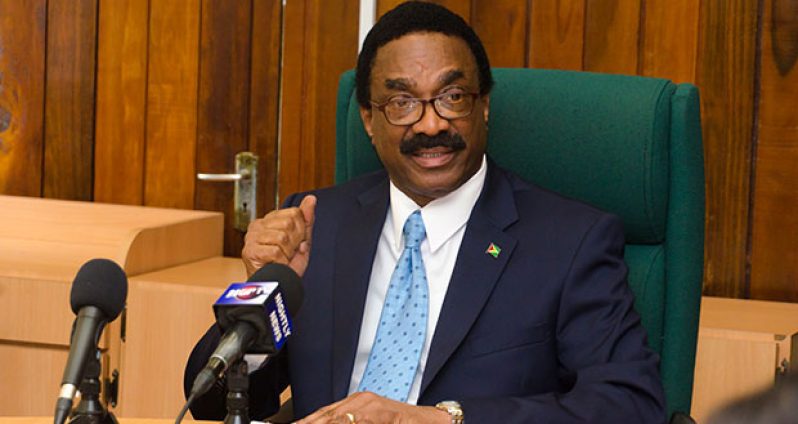– organisation seeks bigger budget to intensify monitoring work
THE Council of Ministers of the Caribbean Action Task Force (CFATF) has wrapped up its annual meeting in Miami, USA with the organisation looking to increase its budget to augment its work at the level of the secretariat.At that meeting, which concluded on Thursday, the organisation also elected Guyana’s Attorney General, Basil Williams, as its deputy chairman for the period 2016-2017; and he will assume chairmanship for the 2017-2018 term. Ms. Rhonda Lee Braithwaithe-Knowles, Attorney General of Turks and Caicos Islands, has been elected chairman. The outgoing chairman is Attorney General of Trinidad and Tobago, Faris Al Rawi.
Speaking to the Guyana Chronicle on Saturday, Mr. Calvin Wilson, Executive Director of CFATF, said the meeting recognised the work of the organisation has become onerous and has recommended an increase in staff, which will necessitate a bigger budget.
At present CFATF is funded by its members, who make annual contributions to the organisation. Wilson has said that although optimism is that member countries would respond to the needs of the organisation, CFATF is acutely aware of the financial strains some countries are dealing with.
“We recognise their problems…Since 2008, when we had the massive recession, a lot of our countries are still to recover; but equally, our members are aware that a strong anti-money laundering regime is crucial to the economic survival of their countries,” Wilson said.
He said flowing from discussions at the meeting, held at the Hilton Hotel in downtown Miami, CFATF may have to adjust its initial schedule for completion of its fourth round of monitoring, because of the work that is required. He said initially it was projected to complete the evaluation of all members by 2022, but this does not seem likely.
Minister Basil Williams recently told a news conference here that the fourth round mutual evaluation from CFATF would test Guyana’s systems for compliance in relation to anti-money laundering and countering the financing of terrorism. “In the fourth round — that is what you call the money round, because you have to not only show compliance, but you have to show effective compliance,” the Attorney General explained. During this round of compliance monitoring, the FATF conducts peer reviews of each member on an ongoing basis, to assess levels of implementation of the organisation’s recommendations, providing an in-depth description and analysis of each country’s system for preventing criminal abuse of the financial system.
According to Minister Williams, Guyana has started preparation for this round of evaluation. “The first round has actually started. We have assayed the fourth round in Guyana because we have started the exercise of de-risking, and the national assessment that has started to identify risks in Guyana; and that would take some time, but we have already introduced that aspect,” the minister explained.
According to FATF’s website, in the fourth round, the scope of the evaluations will involve two inter-related components for technical compliance and effectiveness. The technical compliance component will assess whether the necessary laws, regulations or other required measures are in force and effect, and whether the supporting AML/CFT institutional framework is in place.
The effectiveness component will assess whether the AML/CFT systems are working, and the extent to which the country is achieving the defined set of outcomes.
Since coming to office in May 2015, the coalition government has taken steps to ensure the country’s financial systems become fully compliant with AML/CFT regulations. Among the steps taken are the enactment of the AML/CFT legislation, appointment of a director and deputy director for the Financial Intelligence Unit (FIU), and making the Special Organised Crime Unit (SOCU) functional.
A five-member team from the CFATF/FATF will be making an on-site visit to Guyana during September 14-15 to ensure the country meets the organisation’s compliance requirements for the AML/CFT. The fourth round evaluations will take place after the onsite visit.
The Caribbean Financial Action Task Force (CFATF) is an organisation of 26 states which have agreed to implement common counter-measures to address the problem of criminal money laundering. It was established as the result of meetings convened in Aruba in May 1990 and Jamaica in November 1992. In Aruba, representatives of Western Hemisphere countries, in particular from the Caribbean and from Central America, convened to develop a common approach to the phenomenon of the laundering of the proceeds of crime. Nineteen recommendations constituting this common approach were formulated. These recommendations, which have specific relevance to the region, are complementary to the additional forty recommendations of the Financial Action Task Force, established by the Group of Seven at the 1989 Paris Summit.
The main objective of the Caribbean Financial Action Task Force is to achieve effective implementation of, and compliance with, its recommendations to prevent and control money laundering and to combat the financing of terrorism. The Secretariat has been established as a mechanism to monitor and encourage progress to ensure full implementation of the Kingston Ministerial Declaration.



.jpg)










